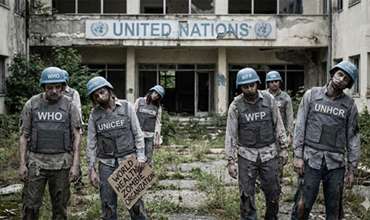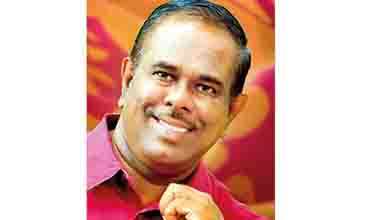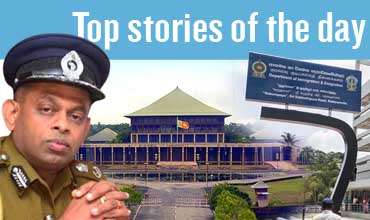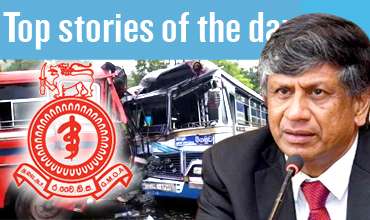Public finance and fiscal consolidation measures for economic development - post COVID-19

By Ananda Amarawansa
The COVID-19 pandemic is an incredible shock for the economies and the life of the citizen in all over the world.
In Sri Lanka, revenue sources, supply chain, production and all other economic activities of the country have been badly affected while the public expenditure increased for health care and the welfare of the people. Market supply came down inevitably.
Industries and all scale production processes were closed down indefinitely. Except food items, all other sectors were disrupted on restrictions to mobility. Demand was curtailed on weakening consumer needs and losing their ability to purchase. Government efforts turned to health care and the welfare of the people and fiscal responsibility stood still while the economy is at the doorstep of a downturn to a recession.
Financial institutions were also affected. They are under threat on negative impact of squeezing the economy and concessionary welfare measures adapted through them by the government. Loans issued to welfare packages are at a risk and risk-weighted financial assets have accumulated in their balance sheets.
The price of financial assets has concurrently depreciated in the market on poor demand due to an unexpected situation and future uncertainties.
Financial stability is also an important factor in the development of the economy since most valuable transactions of the economy are made through the financial system of the country. Bankers are also reluctant to finance the economic activities in an uncertain situation. They are vigilant on public finance and fiscal operations and very concerned about the volatility of return. If the government is expecting rapid growth of the economy through micro financing from state banks to the farmers and the rural industry without proper planning, it will be a factor leading to another crisis. Therefore fiscal policy should not disrupt the financial system of the country at the doorstep of an recession.
Fiscal consolidation
Economic turbulence leading to a recession which would be happening due to the COVID-19 outbreak in the world revives economic instability and experiences in counter policies adapted by many countries to overcome the situations in two post world war periods and one post financial crisis period from 2008.
However traditional fiscal policies are orthodox and not much suitable for counter measures to the recession on the economic shock faced by the country today. Some may say that increase in the public expenditure (current goods and services, gross capital formation and transfers to the people and different institutions) and also lesser increase of the tax revenue and recovery of the deficit balance on debt to develop the economy in the post COVID-19 period will be the counter measures.
We have to deviate from this traditional thought and consider how difficult fiscal consolidation is with the increase of expenditure in the recovery period.
Public financial management and fiscal consolidation plan in time frame can be classified into three items:
1. Long term measures
2. Stimulus measures
3. Short term and medium term measures and adjustments.
All measures and adjustments should be concerned about expenditure and revenue leading to minimize the debt to GDP ratio. According to the Central Bank report of 2019, an analysis of fiscal operations shows where we are.
Accumulated and spiraling poor performance is our debt to GDP ratio. That rose to 86.8 % in 2019 compared to 78.5% in 2015. Another noted point is that provisional fiscal deficit in 2019 rose by 48% compared to the estimated balance. That is bad sign in budgetary control even in the pre COVID-19 period.
As the result of COVID-19, the status of public finance has worsened drastically. It has not been properly managed even in the pre COVID 19 period. Recovery stage of the economy from the setback due to the Easter Sunday tragedy in 2019 has collapsed with the unexpected situation in 2020 due to COVID-19.
We can critically analyze the economic situation not within the period of 2019 and 2020, but also many decades where the real economy was deteriorating. Fiscal deficit and higher degree of public debts continued in the vicious cycle of public finance in the past.
According to many specialists, the COVID -19 pandemic will last for a further two years, before a full recovery happens.
For example, tourism and world trading activities will not be functioning to boost our economy. Therefore, Sri Lanka will have to develop the economy and rely on our own internal counter measures to the recession expected.
If we have lower fiscal consolidation needs, temporary stimulus measures are adequate for deficit reduction with post COVID-19 expenditure.
Sri Lanka needs a credible short term and medium term fiscal consolidation plan with a realistic professional budget ensuring transparency and accountability.
Key measures of debt dynamics are the ratio of Government debt to GDP and debt interest in public expenditure. Debts need to meet the deficit balance of revenue and expenditure. Pre COVID-19 situation in this context was vulnerable to the post period development effort. Rupee depreciation and accumulated debt with interest in rupee terms will hamper the country. However, the situation should not be further aggravated by counter measures to the recession.
Real fiscal consolidation is defined as prudent and firm policies aim at reducing budget deficit and debt accumulation. How to reduce the deficit balance is paradoxical in the planning experience of the world in past recessions where the planners wanted to inject money to the fiscal operation expecting expansion of the market and the economic activities rely on debt financing of the deficit.
Such Keynesian model strategies are not valid any more for countries like Sri Lanka now. The deficit should be managed within the real economic growth in a cycle earning more revenue with less expenditure. That is an exhaustive resource management model based on performances. Therefore we have to look for the domestic policy measures in recovery stage at least to balance domestic demand on domestic supply tightening the import supply to the local market and prioritize the investment programmes to produce production and income in short cycles.
Government Plan
Fiscal consolidation proposals become a government plan to ensure fiscal sustainability. Proposals shall be based on an updated economic forecast and assumptions with essential expenditures. The first plan shall be short term, say one year, for which the extension is required thereafter with front loaded adjustments and a detailed plan on a going concern basis with experience on the operation.
A detailed medium term fiscal consolidation plan is required for sustainable development of the economy by properly managing the three pillars of public finance. They are public revenue, expenditure and debt.
Increasing of development expenditure and revenue reducing the deficit leading to minimize the debt, while increasing the GDP, is the phenomena of expected fiscal consolidation for sustainable economic development in Sri Lanka in a post COVID-19 period ensuring equal distribution of revenue, middle level consumption and less burden to the citizen. This should be a master consolidated plan including public finance and the real production of goods and services.
Expenditure measures
Fiscal consolidation includes revenue and expenditure balancing to minimize the debt.
Expenditure side presents three measures:
1. Operating measures
2. Programming measures
3. Other initiatives
Operating measures include possible reduction of running and maintenance cost of the government including staff and administration cost. Programming measures include adjustments in long term large scale functional activity costs including government transfers to other institutions and provincial governments.
Health, education, social welfare, pension and infrastructure capital expenditures etc are coming under these programmes. Some countries traditionally include personal cost such as salaries and other personal emoluments in the programme expenditure. In such an event, budget planners should be careful not to double count personal costs in operating expenses. Other initiative measures can be defined as all other expenditure reductions by cutting down excess public expenditure in zero value. The Government shall not inject the public funds to SOEs unless their contribution is adding values to the economic development.
Proper management of production, supply and consumption of pharmaceutical goods and correct welfare measures with activity planning will reduce the burden of health care expenditure.
Even in the first phase of the post COVID-19 period, it is not possible to reduce welfare expenditure, but those who are qualified for welfare including Samurdhi recipients should be facilitated and guided to be involved in the agricultural and home production functions expecting their contribution to the GDP.
All bare lands shall be cultivated by them organised in small group and the society concept. Low cost infrastructure facilities such as water supply schemes, rural roads, transport etc should be provided by the government. Introduction of modern technology and methods will attract young employees in this development strategy. This sector development is essential in the post COVID-period. Taskforces of the armed forces shall be deployed in this development strategy as a special and pilot measure in the post COVID-19 period. It must be noted that the dismal point is that growth of the agriculture sector in 2019 was very low; 6% compared to 6.5% in 2018.
Transport expenditure should not be wasted without contributing to the economy. Railway shall be used not only for passenger transport but also to agricultural and provincial production transport scheduling night trips with a joint supply network formulated by the government as value added operations to the economy. That will be a stimulus and relief measure to the farmers also.
Pension reform is another area of expenditure reduction. Increasing of retirement age and restrictions on early retirement of productive professional employees, reduction of uncommon benefits for the retired personnel and introducing hybrid pension benefit plan for the public servants shall be some measures in a pension reform.
Hybrid retirement benefit
Government can introduce an employee provident fund mechanism to the public servant with adjustments to the existing pension scheme. In this hybrid system, pensions shall be restricted to a lesser percentage from the last drawn salaries of the employees while establishing a new retirement benefit plan with employer (Government) and employee monthly contributions to an employee provident fund (EPF).
This shall be a special benefit fund in the methodology of W&OP with a full government guarantee. By qualifying the balances in the fund to interest credits, this can be treated as a compulsory savings of the public servants. This measure will support the current liquidity problem at the Treasury by deferring fair percentage of monthly salary bill on accrual basis. By calculating the pension rate and the government contribution to the fund on age limits of the existing employees, their willingness can be obtained for the system.
Education, research and development expenditure should be efficiently and effectively used for economic growth. Producing more professional employees by education and new production and technology development by research and development will turn the expenditure to real production of goods and services.
Adding value to the administration expenditure will be another strategy to manage public finance. Savings by re-organising the public administration and its functions while adapting financial management measures on performance based budgetary controls systems will contribute to increase the productivity.
Payments other than to the monthly wage bill shall be strictly controlled on the performances. KPIs and norms of the duties should be prepared by the public administration. Government can consider work from home (WFH) strategy with the modern communication technology, extending the experiences in the COVID-19 period to cut down the overhead expenditure in selected ministries and departments on a performance basis.
Politically-motivated government decisions to increase the wage bill and public employment will not contribute to sustainable economic development or to increase GDP unless such labour will be used to increase the real economic activities.
Debt financing of the programmes
We are not in a position to cut down past debt services and termination of committed projects running on foreign loans. However continuation of these projects will accumulate the debt and increase the Government rupee expenditure by its contribution (state funds) committed to the project activities. This will cause a high risk liquidity problem to public finance in the short run. Negotiations shall be initiated to postpone such long term projects if possible, without any compensation.
GDP should be increased with result-based new debt management in the post COVID-19 period. Then the stimulus measures shall be within agriculture and small and medium term industrial production sector including household products. These sectors are to be highly facilitated in the fiscal consolidation plan.
If these sectors need financial assistance and infrastructure development, these would be financed by debts aiming for recoveries within a circle and refinance it. In this process, long term and large infrastructure capital expenditure proposals should be cut down in the budget until the economy recovers to a certain extent.
Donor agencies are normally reluctant to provide foreign loans for income generating and micro financing projects. This policy shall be changed by negotiating with the donors at the world forum considering needed priority measures of the country faced with the past debt burden. Internal bank financing of the economic activities shall be within a limit to keep financial stability of them and the system.
Agricultural and small and medium scale projects financed by debts shall be properly guided, supervised and monitored and audited adapting performance based financial management and reporting strategies with transparency and accountability by the professionals in management.
COVID-19 is not like the tsunami disaster which needed reconstruction effort and public works in post period of the disaster. This time, we can cut down the construction budget for 2-3 years while turning all efforts to increase agricultural and small and medium scale production with low cost stimulus and assistance packages.
We can take counter measures to the recession due to the COVID-19 outbreak by freezing the overall spending at a lower level by mobilizing some public work expenditure for the above development strategy without increasing public debt.
Exchange rate
The Government can reduce foreign exchange outflows by restricting the imports of non-essential food items, luxury and fancy items.
Most consumer items can be substituted by local production while the restrictions will protect the local industries and the farmers and save foreign exchange favourable to the floating exchange rate. Non substitute but luxury and non-essential import items shall be highly taxed.
While cutting down the import of goods and services, avenues of using foreign currency for overseas education shall be stopped by opening professional and higher educational facilities for students here to obtain internationally recognised certificates.
This strategy does not need more infrastructure expenditures. Existing facilities and human resources can be used at a maximum capacity. For example, medical education can be expanded by the Government and private sector within required standards by using the country resources including hospitals for clinical training. Sri Lanka will be a hub of international education in this field.
The Government shall take action to impose limitations on foreign remittances for a certain period letting the foreign investors to reinvest those in Sri Lanka in profitable ventures.
Total expenditure reduction through different measures shall be mostly from programme measures in the short term and medium term until the global situation is normal.
Therefore, priority should not be given for indefinite mega projects such as road and building constructions on foreign loans. It is not prudent to take such loans even as a counter measures to rupee depreciation in the short and medium term in post COVID-19. That objective shall be achieved with the consolidated fiscal developments plan by closing the avenues of outgoing foreign exchange.
Isolated development of infrastructure by assuming foreign investments, without a future plan, is also not a prudent measure. That should be aimed at facilitating the real production of the country. For example, in the colonial era railways have been constructed to provide transport facilities for the estate crops. Cultivation and transport of the production was consolidated in one development plan.
Revenue measures
More attention should be paid to enhance the revenue to meet the essential operational and development expenditure of our economy without increasing the debt burden as done in the past. The measures are depending on the feasibility of the revenue sources, government shares and composition of them and needed fiscal adjustments.
Although 90 per cent of Government revenue is collected from different taxes, this measure will be under threat due to the setback.
Most frequent tax measures in fiscal consolidation are in indirect taxes. We are not in a position to expect these measures any more in the short and medium term due to the market situation, since taxable production and supply will not flow to the market within a certain period and import restrictions are also a counter measure in sustainable development strategies, although it is paradoxical but needed careful check and balance planning.
In revenue measures, not much can be expected from income tax adjustments. In the short run, it is not a fair measure to impose higher tax on individual and business income since they are also subject to the negative impact of the recession. Turnover of the Customs will also be curtailed due to the shrinking of imports and exports and excise duty income will also come down. Therefore new measures should be proposed to maintain revenue.
The Government can introduce wealth tax again with certain limits and increase the fuel tax with immediate effect. The Government shall take progressive action to deploy a property valuation taskforce with professional valuers before imposing the wealth tax. Property taxes already imposed by local governments shall be revised. But they can increase the tax income on new valuation of the properties.
High tax rate can be imposed on fuel during the time of price fall at the world market which is happening now. Further, the Government can continue the fuel price stabilization fund and use it to solve the liquidity problems in the short term. A formula shall be worked out to use this fund for fuel price stability in the local market at the time of excessive price increase in future in the world market.
Environment tax and security tax on beneficiaries, carbon emission tax on all vehicles and an economic rehabilitation tax on all income earners above certain limits are possible measures to increase the revenue of the Government. Exchange profit tax shall be imposed for all foreign exchange earners on excess earning in rupee terms, based on the pre COVID-19 period exchange rate, at the time of withdrawal or exchange the foreign currency in rupees.
The Government shall introduce regulations and strict monitoring measures to mitigate the financial risk, failure and security threat at the financial institution and recover the cost of fiscal support and security measures from such institutions. Special taxes shall be imposed on higher level profit of the businesses and paid bonuses for certain period. Those shall be sector specific taxes without harming the stability of the businesses.
In addition to the tax policies, measures can be implemented to enhance the tax administration adapting standards and managerial strategies to collect taxes in time reducing tax evasion and combating against tax abuses in the informal sector also. Disclosures of earning and financial position with real assets and liabilities in accordance with the general accepted accounting principles shall be ensured with financial statements of the businesses endorsed and audited.
Local Government
Reorganising the provincial and local government systems and activities will serve the economy of the country. Fiscal consolidation shall be ensured by the provincial treasuries in the provinces.
A number of local institutions and provincial functions shall be reviewed to avoid overlapping situations in activities in order to reduce national expenditure. The local government sector shall be reformed to serve the rural sector with income generating small projects without depending on a wage bill from the central government. The local tax system and own revenue generating activities of local authorities should earn income to sustain the local economy.
A new sector bank shall be established instead of local loan development funds to cater to the working capital loan and income generating project financing at the provinces, thereby reducing the central government transfers to the provinces.
Local governments should contribute to the economy without a burden to the national budget. Financially non-viable local authorities shall be amalgamated to reduce the operating expenses in spite of increasing the number of local authorities. Their budgetary control system should be strengthened. Financial and performance reporting system in compliance with the standards shall be immediately implemented to disclose their real assets and liabilities and performances to count the real local production in GDP consolidated with the provincial councils data.
Submission of fiscal budget to the year 2020 has been delayed. The political situation should not be vulnerable to the sustainable economic development of the country. Citizens expect professional public financial management to drive the economy in the right direction by strengthening the fiscal consolidation in the post COVID-19 period. (The writer is a Financial and Economic Analyst).
-
Still No Comments Posted.















Leave Comments